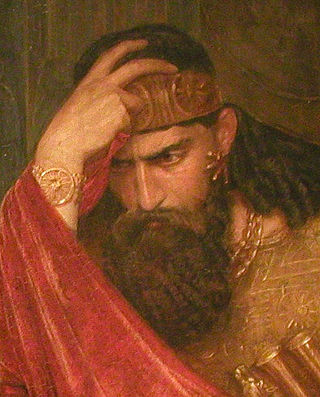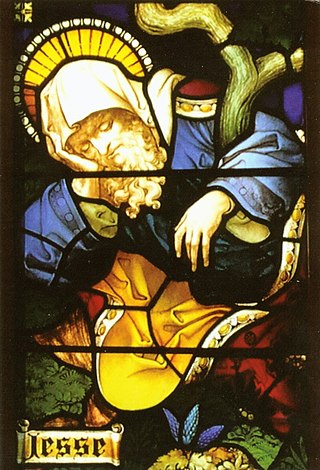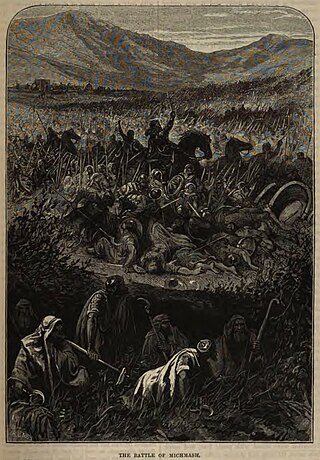Related Research Articles

The Book of Samuel is a book in the Hebrew Bible, found as two books in the Old Testament. The book is part of the Deuteronomistic history, a series of books that constitute a theological history of the Israelites and that aim to explain God's law for Israel under the guidance of the prophets.

David was a king of ancient Israel and Judah and the third king of the United Monarchy, according to the Hebrew Bible and Old Testament.

Saul was a monarch of ancient Israel and Judah and the first king of the United Monarchy, according to the Hebrew Bible and Old Testament. His reign, traditionally placed in the late eleventh century BCE, supposedly marked the transition of the Israelites from a scattered tribal society ruled by various judges to organized statehood.

Samuel is a figure who, in the narratives of the Hebrew Bible, plays a key role in the transition from the biblical judges to the United Kingdom of Israel under Saul, and again in the monarchy's transition from Saul to David. He is venerated as a prophet in Judaism, Christianity, and Islam. In addition to his role in the Bible, Samuel is mentioned in Jewish rabbinical literature, in the Christian New Testament, and in the second chapter of the Quran. He is also treated in the fifth through seventh books of Antiquities of the Jews, written by the Jewish scholar Josephus in the first century. He is first called "the Seer" in 1 Samuel 9:9.

Goliath is a Philistine giant in the Book of Samuel. Descriptions of Goliath's immense stature vary among biblical sources, with various texts describing him between 6 ft 9 in (2.06 m) to 9 ft 9 in (2.97 m) tall. According to the text, Goliath issued a challenge to the Israelites, daring them to send forth a champion to engage him in single combat; he was ultimately defeated by the young shepherd David, employing a sling and stone as a weapon. The narrative signified King Saul's unfitness to rule, as Saul himself should have fought for the Kingdom of Israel.
Achish is a name used in the Hebrew Bible for two Philistine rulers of Gath. It is perhaps only a general title of royalty, applicable to the Philistine kings. The two kings of Gath, which most scholars identify as Tell es-Safi, are:

Shamgar, son of Anath, is the name of one or possibly two individuals named in the Book of Judges. The name occurs twice:
- at the first mention, Shamgar is identified as a man who repelled Philistine incursions into Israelite regions, and slaughtered 600 of the invaders with an ox goad ;
- the other mention is within the Song of Deborah, where Shamgar is described as having been one of the prior rulers, in whose days roads were abandoned, with travelers taking winding paths, and village life collapsing.

Jesse or Yishai ; is a figure described in the Hebrew Bible as the father of David, who became the king of the Israelites. His son David is sometimes called simply "Son of Jesse". The role as both father of King David and ancestor of Jesus has been used in various depictions in art, poetry and music e.g. as the Tree of Jesse or in hymns like "Lo, how a rose e'er blooming."
Jabesh-Gilead, sometimes shortened to Jabesh, was an ancient Israelite town in Gilead, in northwest Jordan. Jabesh is mentioned several times in the Hebrew Bible primarily in connection with King Saul's battles against the Ammonites and Philistines.

Michal was, according to the first Book of Samuel, a princess of the United Kingdom of Israel; the younger daughter of King Saul, she was the first wife of David, who later became king, first of Judah, then of all Israel, making her queen consort of Israel.

Shimei is the name of a number of persons referenced in the Hebrew Bible and Rabbinical literature.

David's Mighty Warriors are a group of 37 men in the Hebrew Bible who fought with King David and are identified in 2 Samuel 23:8–38, part of the "supplementary information" added to the Second Book of Samuel in its final four chapters. The International Standard Version calls them "David's special forces".
Jashobeam, also called Josheb-Basshebeth and possibly Adino the Eznite, was chief of the Three Mighty Warriors, and an officer appointed under King David in charge of the first division of 24,000 men, on duty for the first month of the year, according to the list given in 1 Chronicles 27. Jashobeam was a Benjamite from Hakmon. His father was Zabdiel, a descendant of Korah. He was also a descendant of Pharez of the Tribe of Judah.

According to the Hebrew Bible, the Battle of Michmash was fought between Israelites under Jonathan, son of King Saul and a force of Philistines at Michmash, a town east of Bethel and south of Migron.

Lehi, also known as Ramath Lehi, is a place mentioned in the Bible.

1 Samuel 17 is the seventeenth chapter of the First Book of Samuel in the Old Testament of the Christian Bible or the first part of the Books of Samuel in the Hebrew Bible. According to Jewish tradition the book was attributed to the prophet Samuel, with additions by the prophets Gad and Nathan, but modern scholars view it as a composition of a number of independent texts of various ages from c. 630–540 BCE. This chapter contains the battle of David with Goliath, the Philistine. This is within a section comprising 1 Samuel 16 to 2 Samuel 5 which records the rise of David as the king of Israel.
War in the Hebrew Bible concerns any military engagement narrated or discussed in the Hebrew Bible, also known as the Tanakh or Old Testament of the Bible. Texts about war in the Hebrew Bible are part of the broader topic of The Bible and violence. They cover a wide range of topics from detailed battle reports including weapons and tactics used, numbers of combatants involved, and casualties experienced, to discussions of motives and justifications for war, the sacred and secular aspects of war, descriptions and considerations of what in the modern era would be considered war crimes, such as genocide or wartime sexual violence, and reflections on wars that have happened, or predictions, visions or imaginations of wars that are yet to come.